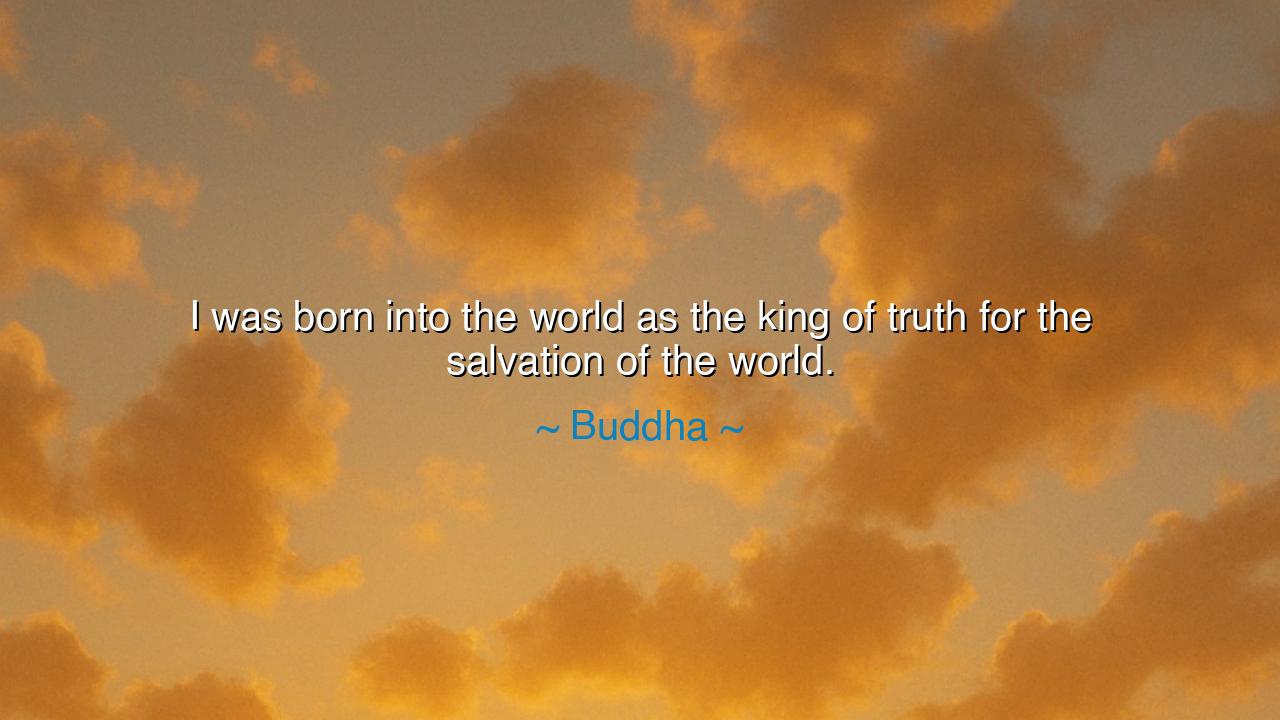
I was born into the world as the king of truth for the salvation






The words attributed to the Buddha—“I was born into the world as the king of truth for the salvation of the world.”—resound with the majesty of one who awakened from illusion and beheld the eternal law of existence. In this declaration, the Buddha does not speak of earthly kingship, nor of dominion over lands and armies. Instead, he proclaims mastery over truth itself, the timeless principle that frees the heart from bondage. To be a king of truth is not to rule by force, but to illumine by wisdom, to offer freedom to all who suffer beneath the tyranny of ignorance and desire.
The origin of these words lies in the great turning of the wheel of Dharma, when the Buddha, having attained enlightenment beneath the Bodhi tree, began to teach the Four Noble Truths. He saw that all beings are bound by suffering, that suffering arises from craving, that liberation is possible, and that the path of mindfulness and compassion leads to release. In proclaiming himself the king of truth, he was not exalting himself, but declaring that he had discovered the universal law that no emperor could overturn. His reign was not temporal, but eternal, for truth endures when palaces crumble and dynasties fade.
The power of this kingship can be seen in history. When Emperor Ashoka of India, a mighty ruler who once delighted in conquest, beheld the rivers of blood left in his wake, he turned in despair. It was the teaching of the Buddha—the truth of compassion and non-violence—that transformed him. Ashoka cast down the sword and raised up the Dharma as his standard. His empire became not a realm of conquest, but of tolerance and care for all living beings. Thus we see how the kingship of truth, though invisible, surpasses the might of iron and fire.
To call himself the king of truth is also to remind us that truth cannot be divided or owned. Unlike the riches of the world, which are hoarded by the few, truth shines upon all equally. A beggar may hold it in his heart as surely as a prince. In this way, the Buddha stood as a savior not by miracle or decree, but by revealing that every soul may walk the path of awakening. His crown was not gold but wisdom; his throne was not marble but the stillness of meditation; his authority was not command but example.
Yet these words also carry a challenge. If the Buddha was born as the king of truth, then each of us, in our own way, is called to become a servant of that truth. We may not rule nations, but we can rule ourselves. We may not save the world in entirety, but we can bring salvation to those within our reach—through compassion, honesty, and the courage to walk in alignment with truth. To ignore truth is to remain a prisoner of suffering; to live by truth is to taste the freedom the Buddha revealed.
The lesson for us is clear: do not seek salvation in power, possessions, or fleeting pleasures. Seek it in truth—in the recognition of suffering, in the practice of compassion, in the relinquishing of selfish desire. The Buddha teaches that kingship lies not in outward dominion but in inner mastery. To live truthfully is to walk the royal path, to lift not only yourself but others out of darkness.
Therefore, take these actions: cultivate mindfulness so you may see reality as it is. Practice compassion daily, for in loving others you embody the truth the Buddha crowned himself with. When you suffer, look to the cause within, and when you find peace, share it outwardly. In this way, you too walk in the lineage of the king of truth, bringing light and salvation not through force, but through wisdom and love. For as the Buddha declared, he was born into the world for the sake of truth, and so are we called to carry that truth into the world.






DHDuong Hoang
Buddha's words are striking because they not only emphasize truth but also position it as a means of salvation. Does this suggest that truth is the ultimate solution to suffering or confusion in the world? If so, how does one embody and spread truth in a world full of distractions and falsehoods? Is there a way for us to live more in line with this kind of truth, and what might the consequences be for doing so?
QHNguyen Quang Hao
Buddha’s proclamation of being the 'king of truth' seems to elevate truth to a divine level. But what does it mean for the salvation of the world? Is truth a universal force that transcends individual understanding, or is it something that must be realized by each person in their own way? How can we recognize the 'truth' in our own lives and contribute to the world’s salvation, as Buddha suggests?
MLMai Linh
This quote makes me reflect on the profound sense of purpose Buddha must have felt in his journey. By declaring himself the 'king of truth,' he’s presenting truth as not just a concept, but a force for saving the world. How do we, as humans, access this 'truth'? Is it inherent in all of us, or is it something we need to discover over time? And does truth really have the power to save?
HNThi Hue Nguyen
Buddha’s statement is both powerful and humbling. He refers to himself as the 'king of truth,' which suggests a deep connection with universal wisdom. Is this the ultimate form of self-awareness, where one fully understands their purpose in the world? If truth can indeed lead to salvation, how can we, as ordinary individuals, apply this understanding to our own lives? Can truth alone really be enough to bring salvation?